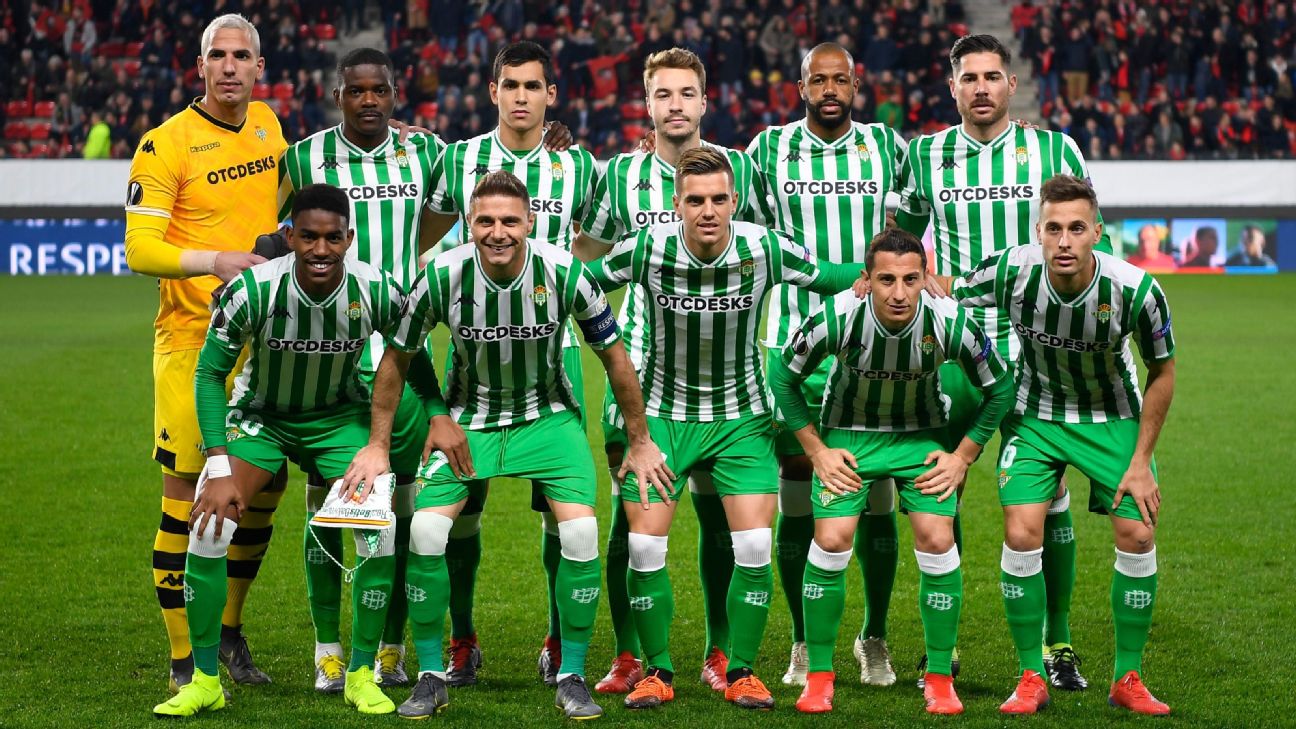

“Bounce, Setien, bounce!”
The chant went around Butarque and found its way to the Real Betis bench, where Quique Setien was not bouncing but was smiling, listening to the sound from the stands, knowing that he had lost this one. His team were 3-0 down at Leganes and the home fans were enjoying it. There was a Mexican wave and olés. There was extra enjoyment, an additional layer to all this which was revealed in another chant that roughly ran: “take that for possession.”
The team with arguably the most clearly defined identity in La Liga, the team with the manager most wedded to an ideal, and the manager most likely to say so, were getting beaten. Not just beaten: battered. The “puritans” had been outplayed. Leganes had scored three, with Youssef En-Nesyri getting a brilliant hat-trick, and it could have been more. Setien’s side had arrived with the chance to move to within two points of a Champions League place but had instead been taken apart, never able to get a hold on the game.
Setien seemed to be taking that well, smiling as the fans mocked him. But what came next suggested that he was smarting a little too. If Leganes’ fans enjoyed last Sunday, they will enjoy it even more next time; an enmity has been created now. The question of style had been raised, which it often is, and so this was taken onto a different sphere.
After the match, Setien admitted that his team had struggled to adapt to the kind of game proposed by the home side. He said that Leganes are a team who do “four things spectacularly well,” noting that “sometimes it works and sometimes it doesn’t, that’s why they’re down where they are.” He insisted that if you asked them “to play like us, they would find it hard.” He also talked about teams who are less concerned about “playing good football.”
It was pointed, and it was unfair. The timing wasn’t great, either; Betis had not been beaten by a lucky deflection or a dodgy decision. They’d been beaten by a better team. One that had racked up 16 shots and dominated the game. A team that far from ‘down’ there were now just three points behind Betis. A team of limited resources, overachieving with a manager who invariably conducts himself with dignity, as he did after the game, refusing to be dragged into a row. Not the kind of man who deserves to be dismissed. An unexpected fight partner.
“Everyone has a different taste,” said Leganes’ manager, Mauricio Pellegrino. “Our fans sing about having come from Segunda B, they are proud of that. I don’t think we have to be ashamed of what we are. There are lots of ways of playing good football. When the ball’s in the air, that’s football too.”
If Pellegrino had held back, others did not. And beyond the criticism of what Setien had said and the way he had said it, a familiar debate began.
Setien has said in the past that there’s something moral in his commitment to an ideal: “I defend this [approach] because this is the way I feel football. Deep down, I defend this way of playing as an ethical question.” That changes things: not least, it changes the way others respond to him, the way that they feel dismissed and disrespected by his determination to defend a particular style of play. And when it goes wrong, maybe that disrespect comes back at him. The price of a “puritanical” approach, perhaps?
 Setien insists on a possession-based approach even when losing a game. He won’t compromise.
Setien insists on a possession-based approach even when losing a game. He won’t compromise.
The suggestion from some that Setien’s approach, his outspoken defence of an ideal, denies room for other types of football, that not everyone is equal, is one he suspects is applied to his team too: his team is held to different standards. Sometimes there’s too little recognition (or protection) of what they do and what they have done, how difficult it is and just how far they have come. Satisfaction is guaranteed by success, which is perhaps less seen than it should be.
Setien has admitted that for someone from the north, the passion of Seville can be difficult to live with, but it goes beyond the city. There’s something about the commitment to an identity that sets the bar higher; that identity can increase the pressure. It wins him supporters — Setien’s been talked about as a future Barcelona coach — but perhaps it also brings misunderstanding and unrealistic expectations. Suddenly, it seems that Betis should be a great side.
Impatience increases, conditioned by those ideals. When they just win, it is not enough; there’s a feeling, rightly or wrongly, that no one else is asked to play “great football” as well, only them. Plus, their flaws and defeats are seized upon more swiftly. Strengths are sometimes interpreted as weaknesses. When they attack, they can’t defend, people say; when they control games, they can’t create, those same people say.
It’s a comfortable argument. What would you prefer: to win or to play well? It’s framed as an either/or question when, in reality, it should be nothing of the sort. The answer is necessarily both.
Playing well helps you win, or is supposed to. There’s this strange assumption that those managers and teams committed to a certain style are less likely to achieve; that somehow, they are choosing not to compete. Betis are often held up as an example of one argument (the pointless possession one) when they are probably a better example of the opposite argument: look what you can do with the ball.
Would they be better doing something different? Would this squad really achieve more doing things differently? Would these players, some of whom came to Betis because of the style, some of whom were even saved by this approach, even be in it?
 Canales, unwanted at Real Madrid, has found his best form under Setien at Betis. He’s not alone, either, as Setien’s methods have brought the best out of several marginalized stars.
Canales, unwanted at Real Madrid, has found his best form under Setien at Betis. He’s not alone, either, as Setien’s methods have brought the best out of several marginalized stars.
Take Sergio Canales, recognised as a great player now, but not previously at Real or Valencia; take Joaquin, resisting retirement still at the age of 37; take Giovani Lo Celso, unwanted by Paris Saint-Germain; take Marc Bartra, unwanted at Barcelona or Dortmund. Setien got in trouble for saying that Bartra must have done “something wrong to have ended up at Betis” but while not the wisest thing to say, there was a kernel of truth in that.
Strip this down to the most basic criteria — achievement — and this is working. Betis are competing better than ever. After a sixth-place finish last year, their highest position in over a decade, they’re on the verge of a European place now.
In the Copa del Rey semifinal, they were 2-0 up but got pulled back to 2-2 by Valencia. Many suggested that they should have sat deep and defended. Setien agreed that they should have protected the result, but that wasn’t the problem. In fact, he said that the opposite was true: what they needed was more “intelligence,” to keep the ball and control instead of chasing. Last night in Rennes in the Europa League last-32, they were 2-0 down inside 10 minutes and 3-1 down at half-time, but went on to draw 3-3 with an injury time equaliser. They didn’t do it by flying at the French side, but by calmly playing their way back in.
And so there they are: Copa del Rey semifinalists, still alive in the Europa League, seventh in La Liga. They have never in their history gone so far into the season and still been active in all three competitions. They have beaten Atletico, Madrid and Barcelona in the past two seasons. They’re doing a lot right even if they did get bounced out of Butarque by Levante for doing things wrong.

Be the first to comment